Friday, March 24, 2006
Administrative Note...
The big news on A Citizen's Blog these days concerns the blogroll. As some people may have noticed, I've added a number of new blogs to the mix, chiefly Mets blogs. There seems to be a lot of energy and enthusiasm from Mets bloggers about the 2006 campaign. It reminds me a lot of the beginning to the 2004 season, when I started. I was enthusiastic, optimist ... I get the same vibe from the new Mets blogs too. I wonder how long it will take them to get cynical.
Anyway, give them a click. Always fun to see what the enemy is thinking and saying. Check out The Eddie Kranepool Society, a long-time Mets blog, and Metsquire, which is written by a fellow attorney. Credit for best title goes to The Musings and Prophecies of Metsradamus. Check them out, everyone I've talked with about links has been pretty nice.
I'm still working on Part III of my season preview, but it has proven difficult. Expect my predictions first, then Part III. I'm also working on an Opening Day post.
(1) comments
Anyway, give them a click. Always fun to see what the enemy is thinking and saying. Check out The Eddie Kranepool Society, a long-time Mets blog, and Metsquire, which is written by a fellow attorney. Credit for best title goes to The Musings and Prophecies of Metsradamus. Check them out, everyone I've talked with about links has been pretty nice.
I'm still working on Part III of my season preview, but it has proven difficult. Expect my predictions first, then Part III. I'm also working on an Opening Day post.
Wednesday, March 22, 2006
Book Review: 3 Nights In August
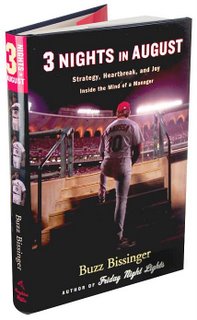 I picked up 3 Nights in August at my local library the other day (couldn't buy it - I don't have enough money) and sat down to read immediately. When the book came out I was intrigued. I'm a big fan of Buzz Bissinger's work: Friday Night Lights was a tremendous book and really directed the national spotlight on the cutthroat competition that is Texas High School football. Bissinger's next book, A Prayer For the City, is a must-read for anyone interested in the city of Philadelphia's recent past. In both Bissinger really dived into the world of his protagonists, and really cut to the core of who they were. You felt like you were right there with them as they got through life in the City of Philadelphia or as they fought to succeed in high school football. I was also interested that Tony LaRussa so willingly participated in the book. I think LaRussa is a great manager and a good person: anyone who devotes so much charitable time to the cause of animal welfare can't be bad. It is also hard to argue with LaRussa's success with the White Sox, the A's and the Cards. LaRussa's intellectual style always impressed me and made me think that he'd be receptive to the ideas and theories of Moneyball. Another thing that intrigued me were the reviews of 3 Nights, which made the book out to be the anti-Moneyball, the ideological tome of the old guard of the baseball establishment. I was disappointed.
I picked up 3 Nights in August at my local library the other day (couldn't buy it - I don't have enough money) and sat down to read immediately. When the book came out I was intrigued. I'm a big fan of Buzz Bissinger's work: Friday Night Lights was a tremendous book and really directed the national spotlight on the cutthroat competition that is Texas High School football. Bissinger's next book, A Prayer For the City, is a must-read for anyone interested in the city of Philadelphia's recent past. In both Bissinger really dived into the world of his protagonists, and really cut to the core of who they were. You felt like you were right there with them as they got through life in the City of Philadelphia or as they fought to succeed in high school football. I was also interested that Tony LaRussa so willingly participated in the book. I think LaRussa is a great manager and a good person: anyone who devotes so much charitable time to the cause of animal welfare can't be bad. It is also hard to argue with LaRussa's success with the White Sox, the A's and the Cards. LaRussa's intellectual style always impressed me and made me think that he'd be receptive to the ideas and theories of Moneyball. Another thing that intrigued me were the reviews of 3 Nights, which made the book out to be the anti-Moneyball, the ideological tome of the old guard of the baseball establishment. I was disappointed.Eagerly, I dove into 3 Nights. I found the book to be less than a rebuke to Moneyball than a sequel or counter-point of sorts to Men At Work, George Will's 1990 baseball book that heavily featured the thoughts of LaRussa on managing (along with Tony Gwynn on hitting, Orel Hershieser on pitching, and Cal Ripken Jr. on fielding). Will styled Men as an "anti-heroic" book, one that dispensed with The Natural-type view of the game as an epic with the overtones of a Greek tragedy, and approached baseball as a blue-collar enterprise with gritty hard work and little glamour. I found Men At Work to be partly a commentary on how modern conservatism views itself (the voice of the common man, the defender of traditional American values, etc.) and partly an attempt by Will, the thin, bookish pundit, to connect with people he obviously admires but in no way resembles. I liked it but after a while Men's theme became repetitive and dull.
3 Nights revisits a lot of the same ground Will covers, but with a slightly different focus. LaRussa as the master strategist, the soulful general directing his soldiers into battle armed with his wits and guile. This is classic baseball player/manager-as-hero territory. There is a lot of great stuff in the book, but it is largely derivative of Will and other books. The difference between 3 Nights and Men is that Bissinger sees LaRussa as being the great hero of an epic tale, where Will saw him as the hero of the working man.
Moneyball is mentioned in passing in the book's foreward, where Bissinger looks down on sabremetrics as turning coaches and GMs into middle managers. You hear the contempt Bissinger feels when you read that the new-wave GMs "view players as pieces of an assembly line; the goal is to quantify the inefficiences that are slowing down production and then to improve on it with cost-effective player parts." Clearly Bissinger is enthralled with the Greek tragedy aspects of the game: the view of sabremetrics as "assembly line" baseball goes to the heart of Bissinger's work. He sees sabremetrics as cold, impersonal, dehumanizing. Bissinger goes on to talk about how LaRussa is "powerfully influenced by the very persuasions the [new-wave GMs] find so pointless: heart, desire, passion, reactions to pressure. After all, these are emotions, and what point is there playing baseball, or any game, if you don't celebrate them?" Just as Friday Night Lights celebrated the tragedy of high school football in Texas and Prayer celebrated the tragedy of the City of Philadelphia, 3 Nights celebrates the tragedy of baseball.
I admit my bias:
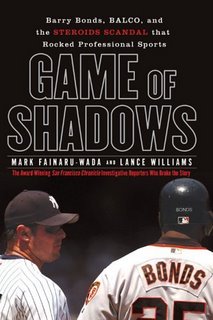 I believe in sabremetrics. I think Moneyball was right on the money. I think Moneyball will rank amongst the top ten most influential books on baseball ever written, right up there with Ball Four, Juiced and The Lords of the Realm. (Game of Shadows, the new book on Barry Bonds steroid use, will probably rank there as well when the Barry Bonds saga finally plays out.) Like Martin Luther nailing his 95 thesis on the door of the Catholic Church in Wittenberg, Germany in 1517, Moneyball declared war on the old guard of baseball and challenged them to justify their beliefs. Moneyball is the leading book of baseball's Enlightenment, its Protestant Reformation. Bill James probably fits the bill as baseball's Martin Luther, but Lewis' Moneyball reached a broad audience and spread James' ideas to the people.
I believe in sabremetrics. I think Moneyball was right on the money. I think Moneyball will rank amongst the top ten most influential books on baseball ever written, right up there with Ball Four, Juiced and The Lords of the Realm. (Game of Shadows, the new book on Barry Bonds steroid use, will probably rank there as well when the Barry Bonds saga finally plays out.) Like Martin Luther nailing his 95 thesis on the door of the Catholic Church in Wittenberg, Germany in 1517, Moneyball declared war on the old guard of baseball and challenged them to justify their beliefs. Moneyball is the leading book of baseball's Enlightenment, its Protestant Reformation. Bill James probably fits the bill as baseball's Martin Luther, but Lewis' Moneyball reached a broad audience and spread James' ideas to the people.People have siezed upon 3 Nights as the leading tome of baseball's counter-enlightenment. I don't really buy it. It's a nice book, but it is too derivative of what has followed before. It doesn't grapple with the arguments of Moneyball, and when it does it gets them wrong: on page 136 Bissinger states that Moneyball stands for the proposition that OBP is the most important stat in baseball*. Wrong. Moneyball holds up OBP as having been ignored as a stat and the best indicator of a young player's future abilities. Moneyball stands for the proposition that the old guard is too conservative and ignores criticism while holding onto the past because it is tradition. Too many people have seized on Bissinger's general criticisms of sabremetrics and have fingered 3 Nights as the old guard's countershot. There is no ideological statement contained here. 3 Nights is a celebration of baseball as Greek tragedy. So in many respects, it is a better counter-point to Men At Work. It is a celebration of LaRussa's success. Maybe Joe Morgan can sit down and write a book (Why I Hate Bill James And Other Thoughts). But this isn't the Anti-Moneyball.
* At another juncture, Bissinger refers to the Red Sox decision during the '04 season to go with a closer-by-committee strategy. The strategy was endorsed by Bill James, who noted that teams often bring in their relief pitchers at incorrect times: i.e., your best reliever should pitch the eighth if the oppositions 3,4,5 hitters are coming up, and another hurler should close out the game in the ninth against weaker hitters. LaRussa, Bissinger proudly notes, knew that James was wrong based on his 4,000 games of coaching experience. Ah. We'll ignore the fact that James is probably correct anyway: Bissinger mischaracterizes James strategy as endorsing a closer-by-committee approach rather than having your best pitcher pitch the most important inning appraoch, which was what James was really endorsing. It is the only time in the book that James is mentioned.
What is 3 Nights? It is not an ideological reaction to Moneyball. It is not breaking new ground. It is a pleasant, well-written book about an excellant manager, and reflects the viewpoint of its author, a journalist interested in tragic, human stories. It is a good book, but its long-term significance in the realm of baseball history is minimal. Moneyball, I suspect, will be talked about and argued about twenty-five years from now. I don't see the same for 3 Nights.
Monday, March 20, 2006
Season Preview: Why Fielding Matters to the Phillies
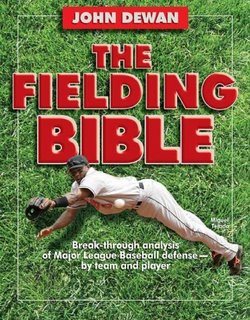
In fact, it may mean everything. Out of the three Season Previews I am writing, this one is the most important and interesting.
Let me take a minute to toss in a plug for John Dewan’s The Fielding Bible. (I'll be reviewing it soon.) As long-time readers of this blog know, I am absolutely fascinated by the subject of defense in baseball and fielding as a concept. I’ve spent a lot of time chewing over the subject, looking for data and examining how reliable it is.
The problem is that what happens on the field isn’t easily definable. Stats like fielding percentage measure how a player handles a ball he gets to, not the ones that he fails to get to. Stats like Range Factor, which measure how often a player is involved in a defensive play, don’t take into account factors like how often pitchers strike batters out or if they are groundballers or flyballers. Stats like Zone Rating measure how often a player should make a play, a rather subjective interpretation. In pitching a strikeout is a strikeout, a walk is a walk and a home run is a home run. In batting, a hit is a hit, a walk is a walk, etc. There are definable plus / minus outcomes
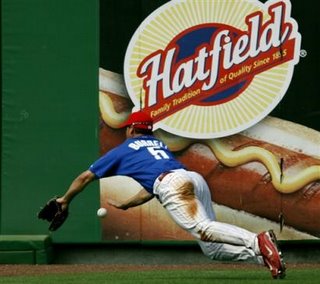 to particular situations. In defense, things are a little murkier. George Will, in discussing the inadequacies of Bill James Range Factor, stated that the problem with fielding in baseball is that “are attempts to put artificial precision into a subject that will not hold still for such precision.” (Men At Work, page 273) Will went on to quote Tom Boswell, who stated that defense is “the poorly lighted room in the gallery.”
to particular situations. In defense, things are a little murkier. George Will, in discussing the inadequacies of Bill James Range Factor, stated that the problem with fielding in baseball is that “are attempts to put artificial precision into a subject that will not hold still for such precision.” (Men At Work, page 273) Will went on to quote Tom Boswell, who stated that defense is “the poorly lighted room in the gallery.”I received The Fielding Bible a week ago and I am utterly, utterly enthralled. More than whenever I get The Bill James Handbook in November of each year. This is the single most valuable tool I have yet found dealing with defense in baseball, because it is the most complex analysis of individual players and teams that I have yet seen. Readers of A Citizen’s Blog can count on learning a lot about fielding this year.
This will be the year of the glove.
Defense is going to be vital to the Phillies in 2006. As I noted last Monday, the Phillies have regressed in pitching in many respects. The addition of Ryan Franklin, a flyball pitcher, in cozy Citizen’s Bank Ballpark is a major mistake the team made in the off-season. The Phillies are going to need good defense to minimize Franklin’s mistakes and to aid Cory Lidle, Ryan Madson and John Lieber, three pitchers that rely heavily on putting the ball into play and allowing fielders to convert the balls into outs.
The good news for the Phillies is that they have been, as a team, very good for the last few years in terms of defense, and they are arguably gotten much, much better in 2006. Gone are Jim Thome and the outfield platoon of Jason Michaels and Kenny Lofton. In are Ryan Howard and Aaron Rowland.
Rowland in particular was a brilliant move on the part of the Phillies. To many observers the deal looked like the Phillies got fleeced: Thome has 430 career home runs and has a career Gross Productive Average of .324; while Rowland had just 13 home runs in 2005 and has a career GPA of .264. The difference is that Rowland is a brilliant fielder and a vital part of the White Sox World Series team. He’s already earning the respect of Phillies fans for his toughness, grit and blue-collar demeanor. The positive effects of his glove are going to be huge for the Phillies in 2006. If the Phillies make the playoffs in 2006, Aaron Rowland is going to be a / the critical factor.
We’ll get to that later. First, let’s discuss team defense.
Defense Efficiency Ratio (DER):
Houston: .706
Philadelphia: .705
St. Louis: .704
New York: .702
Chicago: .701
Los Angeles: .700
San Francisco: .700
Milwaukee: .698
Washington: .698
Pittsburgh: .695
Atlanta: .694
San Diego: .690
Arizona: .684
Cincinnati: .678
Florida: .678
Colorado: .671
NL average: .694
Confused about what I’m talking about? Here are the stats I refer to defined:
ZR (Zone Rating): Is a stat which measures a player’s defensive ability by measuring plays they should have made. Admittedly, this is a stat left open to subjective opinions.
Fielding Percentage: (Putouts + Assists) / (Putouts + Assists + Errors). How often the player successfully handled the ball.
Range Factor: (Putouts + Assists) * 9 / IP. Essentially measures how much a player is involved in defensive plays.
DER (Defense Efficiency Ratio): (Batters Faced – (Hits + Walks + Hit By Pitch + Strikeouts)) / (Batters Faced – (Home Runs, Walks + Hit By Pitch + Strikeouts)) How often fielders convert balls put into play into outs.
GPA (Gross Productive Average): (1.8 * .OBP + .SLG) / 4 = .GPA. Invented by The Hardball Times Aaron Gleeman, GPA measures a players production by weighing his ability to get on base and hit with power. This is my preferred all-around stat.
Runs Created: A stat originally created by Bill James to measure a player’s total contribution to his team’s lineup. Here is the formula ESPN (where I get it from) uses: [(H + BB + HBP - CS - GIDP) times (Total bases + .26[BB - IBB + HBP] + .52[SH + SF + SB])] divided by (AB + BB + HBP + SH+ SF)
While I use DER a lot to rate defenses, I actually use a more sophisticated stat to look at individual players and team defense called Probabilistic Model of Range (PMR). I'm a big fan of Dave Pinto's PMR because it does a great job of analyzing how a team plays defense. In a nutshell, PMR compares a team's "actual" DER with its projected DER (projected from a complicated mathematical formula). Teams that exceed their projected DER are good defensive teams.
Here are the numbers for the National League:
Actual DER / Projected DER (PMR variance)
1. Philadelphia: .703 / .673 (+.0306)
2. Houston: .705 / .677 (+.0281)
3. St. Louis: .703 / .680 (+.0228)
4. Atlanta: .694 / .671 (+.0226)
5. San Francisco: .697 / .679 (+.0177)
6. Chicago: .697 / .683 (+.0148)
7. Pittsburgh: .693 / .679 (+.0138)
8. Arizona: .682 / .668 (+.0137)
9. Los Angeles: .700 / .686 (+.0134)
10. Milwaukee: .696 / .686 (+.0106)
11. New York: .699 / .691 (+.0087)
12. Washington: .697 / .689 (+.0080)
13. Colorado: .671 / .667 (+.0041)
14. San Diego: .690 / .688 (+.0017)
15. Florida: .679 / .678 (+.0007)
16. Cincinnati: .677 / .682 (-.0046)
A positive number indicates that a team is exceeding its projected DER. Click here to review the team numbers for yourself. Note that I only included NL teams and I selected the model that takes parks into accound for 50% of the number (there is a controversy about PMR over the idea that home players skew the numbers, so I'm using the middle-of-the-road numbers).
I’ve used DER and PMR for the last two seasons. This year I’ll be adding John Dewan’s Plus/Minus system that he outlines in The Fielding Bible. The crux of plus / minus is that Dewan and Baseball Info Solutions analyze every defensive play in the MLB and come out with + / - variations: +1 means the player made one play above average. -1 means he made one play below what an average player would have made. Here are the NL teams:
2005 Plus / Minus
1. Philadelphia Phillies: +108
2. Houston Astros: +50
3. Atlanta Braves: +47
4. Los Angeles Dodgers: +36
5. St. Louis Cardinals: +34
6. Chicago Cubs: +21
7. Milwaukee Brewers: +13
8. Pittsburgh Pirates: +4
9. Arizona Diamondbacks: +1
10. Washington Nationals: -4
11. Colorado Rockies: -7
12. San Francisco Giants: -9
13. New York Mets: -20
14. San Diego Padres: -27
15. Cincinnati Reds: -96
16. Florida Marlins: -97
I’d note that the Phillies led the NL by a wide margin and led the MLB by a wide margin as well. The top AL team were the Indians at +69.
Taken as a whole, Plus / Minus, DER and PMR paint a pretty convincing picture, that the Phillies were a tremendous defensive team in 2005.
I. The Infield. The key to the Phillies success is the play of their infielders. The Phillies led the MLB in middle infield and corner infield in Plus / Minus:
Corner: +57 (next-closest: Cards at +33)
Middle: +50 (next-closest: Diamondbacks at +30)
The Phillies have phenomenal fielders and the infield was actually upgraded with the departure
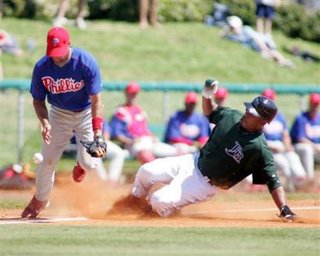 of 1b Jim Thome. Thome may have had a tremendous bat (96 home runs with the Phillies before injuries slowed him down), but he was a sieve in terms of his defense. In 2003 & 2004 he ranked 33rd and 25th respectively among first basemen in plus / minus at -12 and -5. In ’05 he played too few innings (436) to get an accurate view of his performance, but he certainly wasn’t on-track to reverse that trend. Thome’s poor defense explains why the Phillies were -13 in corner infield in ’03. (’04, I should note, is a different story: the Phils were second to the Cards in the MLB in corner +/-, at +30 to the Cards +34. I suspect that number largely due to David Bell’s return from injury rather than from good defensive play from Thome.)
of 1b Jim Thome. Thome may have had a tremendous bat (96 home runs with the Phillies before injuries slowed him down), but he was a sieve in terms of his defense. In 2003 & 2004 he ranked 33rd and 25th respectively among first basemen in plus / minus at -12 and -5. In ’05 he played too few innings (436) to get an accurate view of his performance, but he certainly wasn’t on-track to reverse that trend. Thome’s poor defense explains why the Phillies were -13 in corner infield in ’03. (’04, I should note, is a different story: the Phils were second to the Cards in the MLB in corner +/-, at +30 to the Cards +34. I suspect that number largely due to David Bell’s return from injury rather than from good defensive play from Thome.)Ryan Howard. Thome’s replacement at first base had a terrific season in ’05, hitting 22 home runs in just 88 games, with a .302 GPA. He also had a tremendous season at first base defensively. Check out the numbers:
+ / - (MLB Rank)
2003: Thome, -12 (33rd)
2004: Thome, -5 (25th)
2005: Howard; +16 (2nd)
Howard’s tremendous performance might be because he has far fewer innings on his knees than Thome, but it strongly suggests that he’ll be a force at first for the Phillies for a long-time to come. There really isn't enough data here, but it seems that Howard is primed to do some great work.
Chase Utley. If Chase Utley isn’t the best all-around second baseman in the MLB, I don’t know who is. In his first full season as the Phillies 2b he hit .304 GPA, with 28 home runs, 39 doubles and 105 RBIs (with 16 steals in 19 chances to boot). While Jeff Kent (103.0 Runs Created, compared to Utley’s 110.7) and Alfonso Soriano (105.7 Runs Created) had great years at the plate too, neither were even remotely as good with their gloves:
+ / - (Rank)
Utley: +26 (2nd, behind the D-backs Craig Counsell at +35)
Kent: -5 (22nd)
Soriano: -22 (34th of 36)
Utley is the best second-baseman in the NL and probably in the MLB. The Fielding Bible notes that Utley is very quick and agile, but wasn’t very successful in turning double plays (ranking 34th of 36 2bs). Given how many groundballs Utley sees in a game that is bothersome, but I’d note that the fact that many base-runners the Phils deal with get home by home runs might impact that a bit.
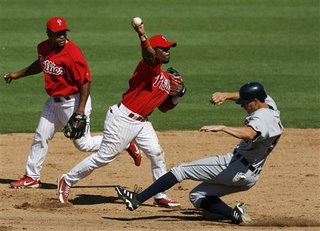 Jimmy Rollins. Will declared the shortstop to be the most important defensive position in baseball because right-handed hitters hit the ball to the left-hand side of the infield and the shortstop needs to have a stronger arm than a second baseman to get the ball to first for the out. The shortstop also needs to be quick to get the ball to second to start the 6-4-3 double play, the great inning killer.
Jimmy Rollins. Will declared the shortstop to be the most important defensive position in baseball because right-handed hitters hit the ball to the left-hand side of the infield and the shortstop needs to have a stronger arm than a second baseman to get the ball to first for the out. The shortstop also needs to be quick to get the ball to second to start the 6-4-3 double play, the great inning killer.Right now people have paid a lot of attention to J.Roll for his hitting streak. 36 games? Impressive stuff. Okay, darn impressive stuff. Jimmy is a good lead-off hitter (doesn’t walk enough for my liking, but that’s for Part III), but his value to the Phils is for his terrific fielding. Check it out:
2005 SS + / -:
1. Adam Everett (Astros): +33
2. Jack Wilson (Pirates): +31
3. Rafael Furcal (Braves): +26
4. Jimmy Rollins (Phillies): +23
5. Neifi Perez (Cubs): +20
I couldn’t help but remember a few years ago when people looked at the AL and gushed about the “embarrassment of riches” at the position: Derek Jeter, A-Rod, Nomar, Miguel Tejada. Jeter ranked 31st of 32 MLB SS’s in + / -, Garciaparra played more games at third last year, A-Rod now plays third (he ranked 7th in + / - in 2005, by the way), and Tejada was 13th in + / -.
The top SS’s are in the NL, and they are Everett, Furcal, Wilson and J.Roll.
Jimmy has played great. He’s third in 3-year + / -, ten behind Wilson and 36 behind Everett. He ranks fifth in 3-year Ground Into Double Play rankings (.622), though he did fall to 14th in 2005 (.598), probably a factor due to Chase Utley’s struggles at converting the GDP (Chase ranked 34th at .444, whereas Rollins old pivot-mate Placido Polanco ranked 6th at .570). John Dewan notes that the secret of J.Roll's success is his ability to get the ball to first with his arm and his quickness. Whatever the outcome of his run at Joe DiMaggio’s hit streak, the Phillies know that they’ve got one of the best shortstops anchoring their defense.
David Bell. People accused Aaron Sele of writing under the pseudonym of Voros McCracken
 when McCracken’s DIPS system was first discussed because McCracken’s DIPS made Sele out to be such a good pitcher. I expect to see people accuse David Bell of ghost-writing parts of The Fielding Bible. Simply put, TFB confirms something I’ve suspected about Bell for years: he may be terrible at the plate, but he’s probably the best defensive third-basemen in baseball.
when McCracken’s DIPS system was first discussed because McCracken’s DIPS made Sele out to be such a good pitcher. I expect to see people accuse David Bell of ghost-writing parts of The Fielding Bible. Simply put, TFB confirms something I’ve suspected about Bell for years: he may be terrible at the plate, but he’s probably the best defensive third-basemen in baseball.Don’t believe me? Scope out some numbers:
2005 3B: + / -
1. David Bell (Phillies): +24
2. Pedro Feliz (Giants): +16
3. Eric Chavez (A’s): +15
4. Morgan Ensberg (Astros): +15
5. Brandon Inge (Tigers): +12
In fact, Bell played so well that John Dewan anointed Bell as the NL Gold Glove That Should Have Been in 2005 over Mike Lowell. Last year wasn’t a fluke either:
2003-2005 3B: + / -
1. Adrian Beltre (Dodgers-Mariners): +71
2. David Bell (Phillies): +52
3. Scott Rolen (Cardinals): +46
4. Eric Chavez (A’s): +37
5. Morgan Ensberg (Astros): +26
Look at Bell’s 3-Year stats:
Bell: 3-Year + / -
2003: +6 (9th)
2004: +21 (3rd)
2005: +24 (1st)
I'd note that he spent much of the 2003 season nobbled by injuries.
In short, David Bell is a terrific defensive third baseman. I would hope he is, because he’s been an absolute nightmare at the plate for the Phillies. In 2005 he hit an appalling .230 GPA, with just 10 home runs. Bell’s 3.44 Runs Created per 27 Outs was the worst on the team, nearly 2 runs worse than the team average of 5.32. I don’t think his defensive skills quite surpass has offensive contributions, but they are a mitigating factor.
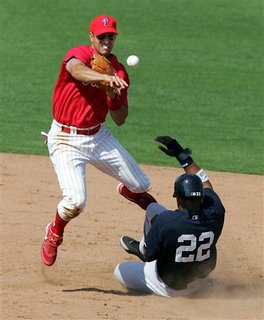 For a more complete picture of the Phillies infield, scope out last year's Fielding Win Shares per 1,000 Innings:
For a more complete picture of the Phillies infield, scope out last year's Fielding Win Shares per 1,000 Innings:1b Howard: 1.70
1b Thome: 1.60
2b/1b Utley: 4.31
3b Bell: 3.62
ss Rollins: 3.61
2b / ss / 3b Polanco: 6.64
1b / 3b / ss Perez: 2.85
I'm not overly impressed by using FWS to judge defensive ability, but I throw that out there. On to the outfield.
The Outfield. Usually kids who can’t field were stuck in the outfield in little league. (Yeah, that was me.) Usually weaker defenders get assignments for the outfield, provided they have enough speed to get to the ball. No surprise that Pat Burrell and Bobby Abreu have anchored the Phillies lineup for some time: they make the big bucks because they are fearsome at the plate, not because they are great defenders. The Phils overall +1 in outfield ranked them 18th in the MLB, while they led the MLB in infield by a wide margin.
The addition of Aaron Rowland should improve that considerably.
Centerfield: the Phils platooned Jason Michaels and Kenny Lofton at center last year after losing out in the Steve Finley sweepstakes. (After Finley’s season, that wasn’t a bad thing.) Michaels, the Phillies reserve OF for the last few years, and Lofton were a low-cost solution to the problem that Marlon Byrd wasn’t going anywhere as the Phillies centerfielder of the future. (Byrd was -15, by the way, in the 2004 season for the Phils, ranking 29th of 32 CFs.)
Michaels and Lofton are both gone, replaced by Rowland. How much better will the Phillies defense be?
2005 + / - (Rank):
Rowland: +30 (1st)
Lofton: +1 (21st)
Michaels: +4 (14th)
In short, tremendously better. Rowland has tremendous range and dazzled Dewan with his abilities. So much so that Dewan anointed Rowland as the Gold Glove That Should Have Been for 2005.
Interestingly, Rowland isn’t that much of an upgrade in terms of his arm:
Extra bases allowed: (Rank)
Michaels: .442 (2nd)
Rowland: .496 (4th)
Lofton: .510 (7th)
Michaels had a great arm, but Rowland has an equally good arm and better range. This is a big upgrade for the Phils.
Leftfield. I’ve argued for a while that too many people knock Pat Burrell’s defensive abilities. Okay, he’s not a gold glover, but he’s very solid and probably better-than-average. In terms of examining the 3-year + / - ratings for LFs, he ranks fourth at +12, largely a product of
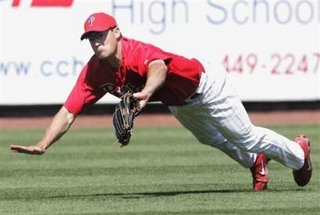 tremendous play in 2003, when he tied for second at +11, 3 behind Carlos Lee. Burrell fell to 19th in ’04, and rebounded to 10th last year.
tremendous play in 2003, when he tied for second at +11, 3 behind Carlos Lee. Burrell fell to 19th in ’04, and rebounded to 10th last year.Pat has good range and a decent arm: .338 bases allowed is fifth over the last three years:
Extra-bases Allowed (Rank)
2003: .364 (6th)
2004: .286 (4th)
2005: .354 (13th)
I’m not arguing that Pat is a great LF, but he’s defensive skills are good and more than justify his tremendous output at the plate: 32 home runs, 110.4 Runs Created, .301 GPA.
Rightfield. Bobby Abreu is a tremendous batter. As I discussed a few days ago, he’s had eight straight seasons with a GPA of .300 or better. He is the Phillies biggest offensive threat, a more dangerous bat than Chase Utley, Ryan Howard or Pat Burrell.
He is a horrible defensive outfielder. Horrible. Check out his three year regression:
+ / - (Rank)
2003: +7 (5th)
2004: -6 (21st)
2005: -13 (28th)
Awful. Simply awful. His throwing stats aren’t much better:
Extra-bases Allowed (Rank)
2003: .421 (5th)
2004: .597 (22nd)
2005: .492 (11th)
Will asked, in the context of the Hall of Fame’s then-failure to include Phillies great Richie Ashburn, why a double denied on defense wasn’t as highly valued as a double hit on offense. Bobby gets a free pass from most of us because of his hitting. My question is why? Bobby gets a double, we applaud. Bobby misses a fly, the batter gets to second, and people shrug their shoulders. Pat Burrell isn’t the consistent hitter Bobby is (it took him the entire 2004 season to recover from his 2003 implosion at the plate), but Pat is a good fielder. His defensive miscues don’t cost the Phillies as badly as Bobby’s do.
I throw this thought out there: maybe Bobby’s defensive mis-steps partly - or entirely - outweigh his achievements at the plate. Maybe we should hold Bobby to a higher standard for his mistakes in the field.
Again, for completeness, here are the Phils 2005 FWS per 1,000 innings for Outfielders:
lf Burrell: 2.47
rf Abreu: 2.71
cf Lofton: 5.13
lf / rf / cf Michaels: 6.30
lf / rf / cf Chavez: 3.09
Catchers. The defensive skills of Mike Lieberthal are a thorny subject. I’m going to take a pass on evaluating Lieberthal and Sal Fasano for now because I need to give it some thought. I note that The Fielding Bible entirely skips the issue of catchers, evaluating all other defensive positions except pitchers. (And pitchers have a negligible impact on team defense anyway.)
How do you evaluate a catcher? How often he throws out base-runners? How many times someone runs on him? (I call that the Mike Piazza Analysis.) Given baseball’s unbalanced schedule that makes things difficult because you play division rivals 19 times a season and all others 6 times. Imagine how guys who caught the Chicago Cubs in the mid-1980s would look like if we looked at how often teams ran on them: they would have played 12% of their games against Willie McGee, Vince Coleman and Ozzie Smith. They’d have a lot of base-runners. They probably wouldn’t have a lot of success against them. But that wouldn’t make them lousy defenders. (By the way, scope out this article from Dan Fox at The Hardball Times on the Cards in the 1980's.)
The catchers ERA? Easy to dismiss: if you catch certain pitchers your ERA fluxuates. Your performance is being evaluated by how someone else performs.
The catcher is a weirdly hybrid position: a lot depends on how his pitcher is doing. A lot depends on his reputation: e.g., we know from watching that Mike Piazza is a lousy defensive catcher, but if guys don’t run on you is that because the word on the street is that you are good on your throw to second base, or are you playing 12% of your games against a team of slow-footed sluggers? I’ll pass for now.
Bench. I'm not really sure how to analyze the Phillies bench. For years we knew that Jason Michaels was going to be the Phillies reserve outfielder, so there was a decent amout of data to analyze. Not so much anymore. Shance Victorino seems likely to be the Phillies #4 outfielder, and he's played just 208 defensive innings in his career, and just 16 with the Phils in 2005. There simply isn't enough data to know if Victorino is going to be any good.
The Phillies key defensive bench player seems to be Alex Gonzalez, who played 109 games last year with the D-Rays. Gonzalez will get a decent amount of playing time due to the persistent injuries David Bell seems to be suffering. Gonzalez played 779 innings at third with the D-Rays, and earned a 0 +/- rating. The good news is that Dewan's scouting report of Gonzalez notes that he's a strong player with good instincts. I doubt there will be any real drop-off with Gonzalez manning the hot corner.
Gonzalez's signing means that Tomas Perez, the Phils long-term utility man, will be let go. Perez played third, first and short for the Phils in 2005, but he seems to have lost his spot as the Phils glove-man off the bench.
I suspect that unless the Phils suffer a major injury we won't see too much from the Phils defensive bench: the Phils don't make many defensive substitutions and the quality of the Phils bench has declined since Michaels was dealt and Placido Polanco left during the '05 season. Aside from seeing Alex Gonzalez at third rather than David Bell, I don't really expect to see Shane Victorino subbing too much aside from pinch-hitting.
Bottom-line, the Phils bench isn't that important.
Conclusion. As I said at the outset, this is the year of the glove. The Phillies have significantly upgraded their defensive alignment with the additions of Aaron Rowland and Ryan Howard to the field. I think this will be huge for the team. As I said in Part I of my season preview, the Phillies pitching staff is regressing. The ability of Phillies fielders to get to the ball and convert shallow popflies and line-drives into outs is vital. When Ryan Franklin surrenders the 450-foot home run to Carlos Delgado, the Phillies need to make sure that Carlos Beltran didn’t get on ahead of him with a bloop single.
An improved defense is worth a few runs in some close games. An improved defense could be the difference between 88 wins and having nothing to do in October, or 90 wins and being in the World Series. An improved defense can buttress the confidence of the Phillies pitching staff.
Do the Phils have room for improvement? Sure. They ranked 19th in converting double play opportunities (.387), and ranked 19th in bunt defense (.504). I suspect that David Bell's knees figured in the latter and Chase Utley's struggles at turning the pivot figured in the former. If Chase improves his skills at the pivot, I think the Phils will be fantastic.
I expect the Phillies to have the best defense in the MLB in 2006. I expect this team to lead the league in DER and Plus / Minus. I expect the Phillies pitching staff to pitch significantly behind their DIPS ERA because Aaron Rowland is going to hide the fact that they have problems, just like the Phils did in ‘04 when Eric Milton was 11-2 with an ERA of 5+.
If the Phillies make the playoffs it will because of their fielding.
Coming Up Next .... I will review Buzz Bissinger's 3 Nights in August on Thursday (you'll be surprised with what I have to say), followed by my AL Season Predictions next Monday. Expect my NL Season Predictions Wednesday, March 29th. Don't expect Part III, Batting, until late next week because I am having some difficulty writing it. On the horizon, I am writing reviews for The Fielding Bible and a retrospective review of Men At Work.











